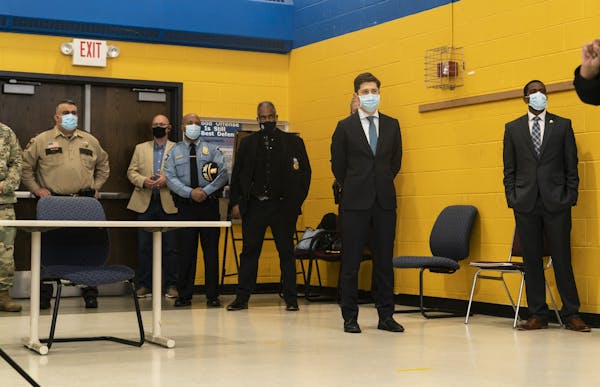Gov. Tim Walz on Monday issued a curfew in Hennepin, Ramsey, Anoka and Dakota counties from 7 p.m. until 6 a.m. Tuesday in the wake of a night of unrest following the Sunday death of Daunte Wright, a 20-year-old Black man shot and killed by police in Brooklyn Center.
As they announced the curfews, state and city leaders tried to strike a balance: acknowledging that Wright's death had caused immense pain but also telling people they wouldn't tolerate violence.
"For those who choose to go out … to exploit these tragedies for destruction or personal gain, you can rest assured that the largest police presence in Minnesota history in coordination will be prepared," Walz said at a news conference Monday afternoon.
"You will be arrested. You will be charged. And there will be consequences for those actions," the governor said.
Minneapolis Mayor Jacob Frey and St. Paul Mayor Melvin Carter declared states of emergency in both cities. Travel is prohibited on public streets and in other public places, with a few exceptions.
Emergency responders and the media are exempt from the curfew, as are those traveling directly to and from work, seeking emergency care, fleeing dangerous circumstances or experiencing homelessness.
Those traveling to and from religious services are also exempt from the curfew, an exception clarified after the Minnesota Chapter of the Council on American-Islamic Relations (CAIR) issued a statement condemning officials for preventing prayer gatherings on the first night of Ramadan.
Violators of the curfew could face misdemeanor charges punishable by a $1,000 fine or 90 days in prison, according to Walz's executive order.
At the news conference, Carter said people had "experienced a trauma and a heartache that's just too big for words."
"There's no space in my heart where I accept what happened last night, what's played out over and over again. There's no space in my heart where I feel patient about our urgent need to stop this from recurring," Carter said.
Frey said that community groups partnering with the city of Minneapolis will also be exempt from the curfew and patrol streets trying to calm conflicts before they escalate into violence.
"The anguish we are suffering cannot translate into violence, destroying livelihoods, destroying locally owned businesses that our communities have poured their hearts and soul into for decades, and the unraveling of the sacrifices that people have made for so long," Frey said. "That cannot — that will not — be tolerated."
Minnesota Public Safety Commissioner John Harrington said at the news conference that "hundreds of uniformed officials" will be patrolling the streets Monday evening. He added that officials chose to start the curfew at 7 p.m. because they found past curfews to be more effective if they began before sunset, which is expected shortly before 8 p.m. Monday.
The Twins postponed a home game against the Boston Red Sox, and the state Health Department announced it would close COVID-19 testing sites at the airport and Brooklyn Park's Starlite Center at 5:30 p.m. to allow Minnesotans ample time to reach their homes before the curfew.
The National Guard, which was already planning to ramp up its presence in the Twin Cities as closing arguments approach in the Derek Chauvin trial, had activated 500 personnel as of Monday morning. Maj. Gen. Shawn Manke, head of the Minnesota National Guard, said that number could grow to 1,000 by the end of the day.
"You will see significant resources out today," Harrington said, adding that the curfew will make it "simpler and easier to identify those bad actors."
Staff writer Liz Navratil contributed to this report.
Katie Galioto • 612-673-4478
